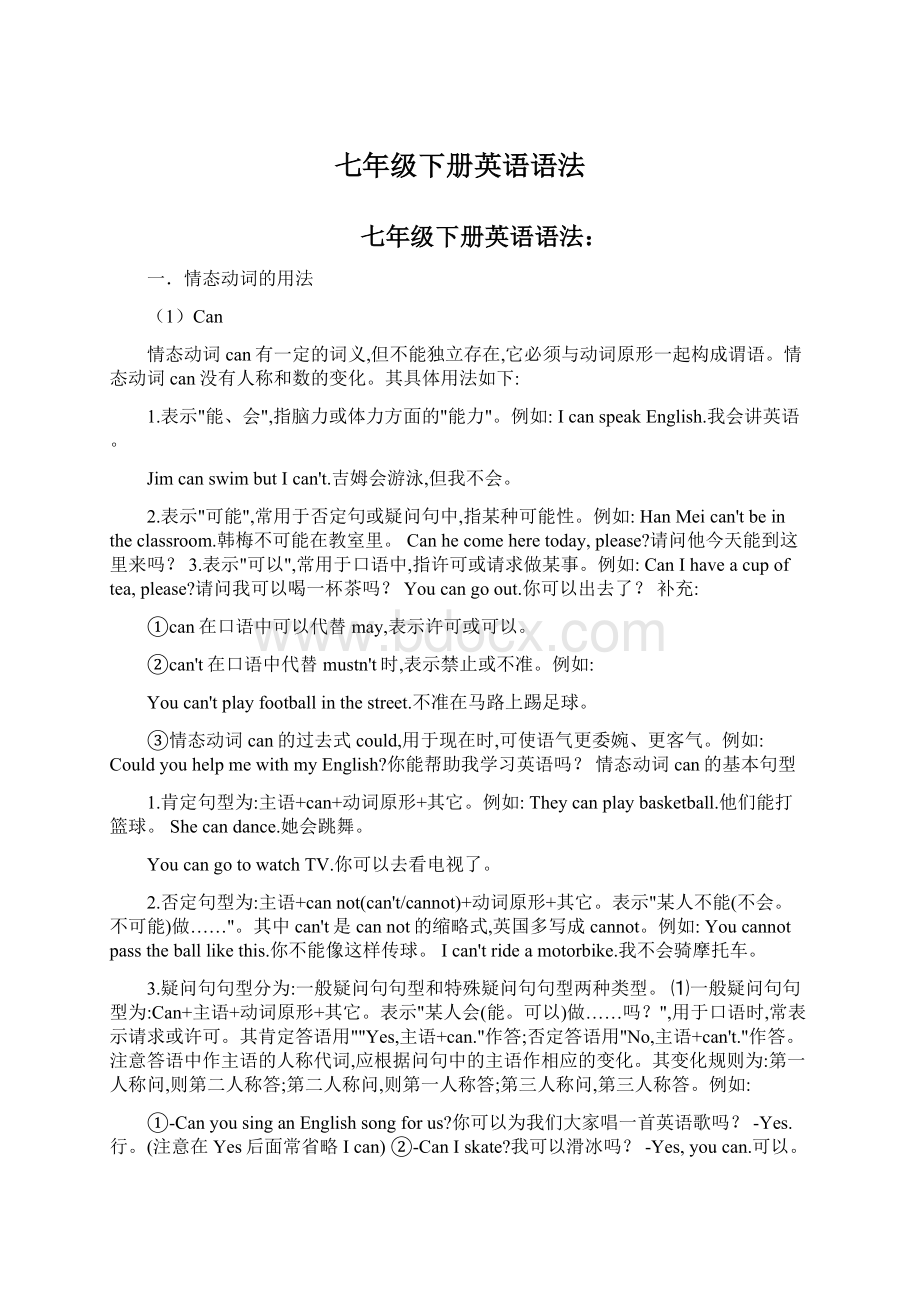七年级下册英语语法.docx
《七年级下册英语语法.docx》由会员分享,可在线阅读,更多相关《七年级下册英语语法.docx(9页珍藏版)》请在冰豆网上搜索。

七年级下册英语语法
七年级下册英语语法:
一.情态动词的用法
(1)Can
情态动词can有一定的词义,但不能独立存在,它必须与动词原形一起构成谓语。
情态动词can没有人称和数的变化。
其具体用法如下:
1.表示"能、会",指脑力或体力方面的"能力"。
例如:
IcanspeakEnglish.我会讲英语。
JimcanswimbutIcan't.吉姆会游泳,但我不会。
2.表示"可能",常用于否定句或疑问句中,指某种可能性。
例如:
HanMeican'tbeintheclassroom.韩梅不可能在教室里。
Canhecomeheretoday,please?
请问他今天能到这里来吗?
3.表示"可以",常用于口语中,指许可或请求做某事。
例如:
CanIhaveacupoftea,please?
请问我可以喝一杯茶吗?
Youcangoout.你可以出去了?
补充:
①can在口语中可以代替may,表示许可或可以。
②can't在口语中代替mustn't时,表示禁止或不准。
例如:
Youcan'tplayfootballinthestreet.不准在马路上踢足球。
③情态动词can的过去式could,用于现在时,可使语气更委婉、更客气。
例如:
CouldyouhelpmewithmyEnglish?
你能帮助我学习英语吗?
情态动词can的基本句型
1.肯定句型为:
主语+can+动词原形+其它。
例如:
Theycanplaybasketball.他们能打篮球。
Shecandance.她会跳舞。
YoucangotowatchTV.你可以去看电视了。
2.否定句型为:
主语+cannot(can't/cannot)+动词原形+其它。
表示"某人不能(不会。
不可能)做……"。
其中can't是cannot的缩略式,英国多写成cannot。
例如:
Youcannotpasstheballlikethis.你不能像这样传球。
Ican'trideamotorbike.我不会骑摩托车。
3.疑问句句型分为:
一般疑问句句型和特殊疑问句句型两种类型。
⑴一般疑问句句型为:
Can+主语+动词原形+其它。
表示"某人会(能。
可以)做……吗?
",用于口语时,常表示请求或许可。
其肯定答语用""Yes,主语+can."作答;否定答语用"No,主语+can't."作答。
注意答语中作主语的人称代词,应根据问句中的主语作相应的变化。
其变化规则为:
第一人称问,则第二人称答;第二人称问,则第一人称答;第三人称问,第三人称答。
例如:
①-CanyousinganEnglishsongforus?
你可以为我们大家唱一首英语歌吗?
-Yes.行。
(注意在Yes后面常省略Ican)②-CanIskate?
我可以滑冰吗?
-Yes,youcan.可以。
③-Cansheclimbhills?
她能爬山吗?
-No,shecan't.不,她不能。
⑵特殊疑问句句型为:
a.Who+can+动词原形+其它。
该句型中who相当于主语。
例如:
-WhocansinginEnglishinyourclass?
你们班上谁会用英语唱歌?
-Lilycan.莉莉会。
b.特殊疑问词(作定语)+名词+can+主语+动词原形+其它。
该句型中的特殊疑问词常用howmany,howmuch等。
例如:
-Howmanyboatscanyouseeintheriver?
你能看见河中有多少只船吗?
-Onlyoneboat.仅有一只。
c.特殊疑问词+can+主语+动词原形+其它。
该句型中的特殊疑问词常用what,where,when等,一般用肯定陈述句作答。
例如:
-Whatcanyouseeinthepicture?
你能在图画中看到什么?
-Icanseesomebirdsandtwobigtreesinit.我能看到一些鸟儿和两棵大树。
Ⅰ.单项选择(15分)
()1.Mysisterlikesplayingtheguitar,butshecan’tplay______.
A.niceB.goodC.well
()2.—Areyougood____swimming?
—Yes,andIthinkIcanhelpkids___it.A.with;inB.with;withC.at;with
3.Hewants______theEnglishclub.
A.tojoinB.tobeC.bein
()4.Myfathercan’tplay______basketball.Hecanplay______piano.A.the;theB./;theC.the;/
()5.—Whydoyouwantto______theEnglishclub?
BecauseMrLiintheclubisgood___us.
A.have;withB.join;withC.join;at
()6.Mybrotherdoesn’tlikeplayingbasketball_______watchingTV.
A.andB.butC.or
()7.—CanyouspeakChinese,Tom?
—Yes,butonly______.
A.lotsofB.manyC.alittle
()8.—_______doyouwanttojoin?
—Themusicclub.
A.WhatclubB.WhenC.What
()9.Hi!
CanIhelpyou?
__.Iwanttojointheclub.
A.No,thanksalotB.GreatC.Yes,please
()10.—___?
—HecandoChinesekungfuwell.
A.CanhedoChinesekungfuB.Whatcanhedo
C.DoeshewanttojointheChinesekungfuclub
()11.---Whatcanyoudo?
---Ican_____.
A.playtheguitarB.playviolinC.swimmingD.jointheclub
()12.---CanTomhelpkids_____swimming?
--Yes,can.A.xB.withC.forD.to
()13.---___doyouwanttojointhechessclub?
---BecauseIlikechessverymuch.
A.WhoB.HowC.WhyD.What
()14.Whatisthefirstdayoftheweek?
A.MondayB.FridayC.SaturdayD.Sunday
()15.Icanswimwell.Iwanttojointhe___club.
AmusicBchessCswimmingD、musician
1.Ginawantstoj________themusicclub.
2.Canyous________English?
3.Icanplaytheguitarbutcan’tplaythep________.
4.Canyouh________kidswithswimming?
用所给单词适当形式填空
41.—Canyouhelpkidswith_____(dance)?
—Yes,Ican.
42.Theywant_____(join)thebaseballclub.
43.Canyou_____(sing)?
44.Thegirllikesmusic.Shewantstobea______(music).
45.Doyouwanttojointhe_______(swim)club?
46.Areyougoodwith______(kid),Jim?
47Hewantstojointhe____(dance)club.
48.Shecan_______(play)basketball.
49.Shecanhelp______(I)with______(I)English.
50.Ineed______(buy)apen?
现在进行时
1.定义:
表示现在或现阶段正在进行的动作。
常与now,thesedays等时间状语连用,句首有Look!
/Listen!
等提示语。
I’mvisitingmyfriendsnow.Look!
Heissittingthere.2.基本结构:
be动词(am,is,are)+动词的现在分词构成(动词-ing)
肯定句:
be+doing否定句:
be+notdoing一般疑问句:
Be动词提前到句子开头+主语+doing
记忆口诀:
现在进行主动宾,be+动词-ing要记清;助动词(am,is,are)跟着主语变,am,is,are+-ing;
变疑问,助动词(am,is,are)后主语跟,变否定,助动词(am,is,are)后not跟。
例句:
肯定句:
Iamworking.Heisworking.Theyareworking.否定句:
Iamnotworking.Heisnotworking.Theyarenotworking.疑问句:
Areyouworking?
Isheworking?
Aretheyworking?
回答:
Yes,Iam.Yes,heis.Yes,theyare.
No,I’mnot.No,heisn’t.No,theyaren’t.
注意:
现在进行时的特殊用法:
1)现在进行时与always连用时,往往含有赞扬、厌恶、责备等感情色彩。
如:
Heisalwaysworkinghard.他总是非常努力地工作。
(表示赞扬)
2)come,go,begin,start,leave等动词常用现在进行时表示将要发生的动作。
SheisleavingChinatomorrow.I'mgoingtoschool.3.现在分词的变法规则:
当我们说某人正在做什么事时,动词要使用分词形式,不能用原形,
构成如下:
一)一般在后加ing。
如:
sing-singing,see-seeing,play-playing,go-going,do-doing,
二)以不发音e的结尾的去掉e再加ing。
如:
write-writing,have-having,come–coming来;close-closing关;make–making制造ride–riding骑;write-writing写;take-taking拿走;have–having有;
三)以重读闭音节结尾且一个元音字母+一个辅音字母要双写最后的辅音字母再加ing。
如:
put-putting,run-running,get-getting,let-letting,begin-beginning;sit-sitting;cut–cutting切;shop-shopping购物;begin-beginning开始forget-forgetting忘记;stop-stopping停止travel-travelling旅行;begin—beginning开始;swim—swimming游泳;run—running跑步;put—putting放;let—letting让;get—getting得到
四)以ie结尾的变ie为y再加ing。
如:
tie-tying系die-dying死lie-lying位于
现在进行时态专项练习
一、写出下列动词的现在分词形式
stay_____do______listen______forget______refuse______close_______travel______die______work_____spend_____look______make____put______sit_____run____tie_______take____give_______ride_______please______win______begin____open____lie___
二、用所给动词的适当形式填空
1.MaryandLucyare________(dance)now.
2.Listen!
Someoneis_______(play)thepianointhenextroom.
3.Heis__________(sweep)theflooratthemoment.
4.Look!
Thecat________________(eat)thefishonthetable.
5.A:
______you_______(study)French?
B:
Yes,Iam.
6.Sheoften____________(dance)afterschool.
7.Myfatherandmother____________(swim)inthepond.
8.Mysisteris________(fly)akiteinthegarden.
9.Weare__________(watch)TVnow.
10.Bequiet!
Thebaby___________(sleep)now.
三.单选
1、Look!
He_____theirmotherdothehousework.
A.ishelpingB.arehelpC.ishelpD.ishelpping
2、_____aretheboysdoing?
Theyaresingingintheroom.A.WhoB.HowC.WhatD.Where
3、Don’ttalkhere.Mymother_____.
A.issleepingB.aresleepingC.SleepingD.sleep
4、Danny______.Don’tcallhim.
A.iswriteingB.iswritingC.writingD.writes
5、–When_____he_____back?
–Sorry,Idon’tknow.
A.does,comeB.arecomingC.iscomeD.iscoming
6.Who_____overtherenow?
A.singingB.aresingC.issingingD.sing
7.It’seighto’clock.Thestudents_____anEnglishclass.
A.haveB.havingC.ishavingD.arehaving
8.Listen!
Thebaby_____inthenextroom.
A.cryingB.criedC.iscryingD.cries
9.Look!
Thetwins_____newsweaters.
A.arewearingB.wearingC.arewearD.iswearing
10.Don’ttalkhere.Grandparents_____.
A.issleepingB.aresleepingC.sleepingD.sleep
11.Tomisaworker.He____inafactory.Hissisters_____inahospital.
A.work/workB.works/workC.work/works
12.Who_____Englishbestinyourclass?
A.speakB.speaksC.Speaking
13.Mrs.Read_____thewindowseveryday.
A.iscleaningB.cleanC.cleans
14.We_____musicandoften_____tomusic.
A.like/listenB.likes/listensC.like/arelistening
15.She_____upatsixinthemorning.
A.getB.getsC.getting
16.OnSundayshesometimes_____hisclothesandsometimes_____someshopping.
A.wash/doB.iswashing/isdoingC.washes/does
17.Thetwinsusually_____milkandbreadforbreakfast,butJim_____somecoffeeforit.A.have/haveB.have/hasC.has/have
语法一般过去时句式
一、一般过去时的概念:
一般过去时表示过去某个时间发生的动作或存在的状态,常和表示过去的时间状语连用,如:
lastyear,yesterday,in1990,twodaysago等;也可表示过去经常反复发生的动作,常和often,always等频率副词连用。
例如:
①Isawhiminthestreetyesterday.昨天我在街上看见他了。
②LiMeialwayswenttoschoolonfootlastyear.去年李梅总是步行上学。
二、一般过去时的构成:
1.be动词的一般过去时的构成:
第一人称单数和第三人称单数用was,其余人称用were例如:
①Iwastenyearsoldatthattime.
②Thereweremanypeoplestandinginfrontofthedoor.2.实义动词的一般过去时的构成:
(1)规则动词过去式的构成有四条规则:
①一般在动词原形末尾直接加上ed。
如:
look---lookedwork---workedjump---jumpedstay---stayed
②以不发音的字母e结尾的动词,直接加d。
如:
live---livedclose---closeddance---danced
③末尾只有一个辅音字母的重读闭音节,先双写这个辅音字母,再加ed。
如:
stop---stoppedshop---shoppedprefer---preferred④末尾是辅音字母加y结尾的动词,先变y为i,然后再加ed。
如:
study---studiedtry---tried
(2)不规则动词的过去式需特殊记忆。
如:
am(is)---wasare---werego---wentcome---cametake---tookhave(has)---had
3、一般过去时的几种句型:
(1)be动词的一般过去时的句型:
①肯定句结构为:
主语+was/were+其它。
如:
Iwasathomeyesterday.
Theywerereallyhappyattheparty.
②否定句结构为:
主语+wasnot(wasn’t)/werenot(weren’t)+其它。
如:
Iwasn’tathomeyesterday.Theyweren’thappyattheparty.
③一般疑问句结构为:
Was/Were+主语+其它?
如:
---Wereyouathomeyesterday?
---Yes,Iwas./No,Iwasn’t.
---Weretheyhappyattheparty?
---Yes,theywere./No,theyweren’t.
④特殊疑问句结构为:
疑问词+was/were+主语+其它?
如:
---Wherewereyoulastnight?
---Wewereatmyuncle’shouse.---Howwasyourweekend?
---Itwasgreat.
(2)实义动词的一般过去时的句型:
①肯定句结构为:
主语+动词的过去式+其它。
如:
Hewenttothetoystoreyesterday.Wetooksomepicturesinthepark.②否定句结构为:
主语+didnot(didn’t)+动词原形+其它。
如:
Hedidn'tgotothetoystoreyesterday.Wedidn’ttakeanypicturesinthepark.③一般疑问句结构为:
Did+主语+动词原形+其它?
如:
---DidyougotoBeijinglastweek?
---Yes,Idid./No,Ididn’t.---Didhemeetthebusinessmanbefore?
---No,hedidn't./Yes,hedid.
④特殊疑问句结构为:
疑问词+did+主语+动词原形+其它?
如:
---Whatdidyoudolastnight?
---Ididmyhom